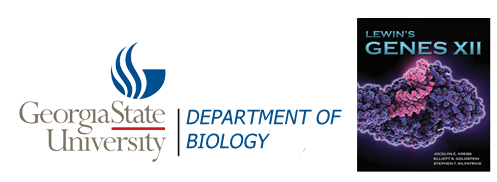- Home
Welcome !
Welcome to my home page for this particular lecture series. This site is designed as a hub for curating and sharing of lectures and lecture material, course syllabi, assignments and links to relevant resources. The web-site is maintained by me. Therefore, material on this site normally supersedes all other course information found elsewhere (such as icollege). You can use the menu bar that is located below the course logo to navigate through the site and to find potential links that may be pertinent to this course -or research and study in the Biological Sciences in general.

- BIOL 4564/6564
- Courses
- Resources
General Resources

Biology 4564/6564, Maymester '22 CRN# 54968 / 55729
| Location: | 171 Petit Science Center |
| Time: | 12:00 pm - 3:10 pm |
| Credit Hours: | 4 hr |
______
| Lecturer: | Dr. John Houghton | |
| Office: | 520 Petit Science Center | |
| Laboratory: | 657 Petit Science Center | |
| email: | jhoughton@gsu.edu | |
| Office Phone: | (404) 413-5390 | |
| Office hours: | Daily: 3:10pm - 3:45pm |
______
| Text: | Lewin's Genes XII: Jocelyn Krebs, Elliott Goldstein and Stephen Kilpatrick | Jones & Bartlett Publishers |
Lewin's Genes XII: Vital Source- https://www.vitalsource.com/textbooks |
Reading assignments in the text book are indicated in the lecture schedule. The background information for some of the lectures will either be in the form of web-links, handouts or journal articles. Diagrams used in lectures that are not from the textbook will be posted on the web, handed out in class or made available as downloads. Exams will be based primarily on lecture material. However, reading assignments (text, papers and handouts) should be used to understand the lecture material and provide additional examples.
Grading Policy * : Grades will be divided amomg the various examinations in the following manner-
| Exam I | 150 pts |
| Exam II | 150 pts |
| Exam III | 200 pts |
In-Class Presentation -6564 |
100 pts |
| Presentation Review -4564 | 100 pts |
| Total | 600 pts. |
Grading Scale: 97-100= A+, 90-96= A, 88-89= A-, 86-87= B+, 80-85= B, 78-79= B-, 77-78= C+, 70-76= C, 68-69= C-, 60-67= D, less than 60= F
* Please note that this syllabus provides a plan for the course, however, deviations may be necessary.
Goals of the Course: The intent of this series of lectures is to familiarize you withan advanced understanding of Genetics and the rapidly moving field of Molecular Genetics. The course is also designed to stimulate you not only to understand these Genetic concepts, but to also to communicate advances in the field through questions and power point presentations.
Students will be evaluated on their ability to successfully integrate course material and concepts from different lectures. Students are expected to write thoughtful, well-organized answers to the exam questions. Although the ability to integrate general concepts and critical details is most important, students are also expected to understand the technical aspects of the course material that is covered.
The exams (in-class) will initially consist of a few short answer questions, along with a couple of longer, discussion type questions that will demonstrate the student's ability to synthesize their own arguments from the material covered. As the course progresses the majority of questions will eventually become more of the discussion type, essay questions. Each exam (except the Final) will cover ONLY the material that has been covered in lectures given since the previous exam. However, conceptual foundations established in each of the lectures need to be well understood since they will provide the necessary foundation for understanding material in subsequent lectures.
The exams (in-class) will consist of a few short answer questions, but (as the course progresses) the majority of questions will eventually be essay questions. Each exam (except the Final) will cover only the material in those lectures given since the previous exam and so will not be comprehensive. However, conceptual foundations established in each of the lectures need to be well understood since they will provide the necessary foundation for understanding material in subsequent lectures. Please make every effort to take the exams on the scheduled dates. Makeup exams should be taken only under very special circumstances. Please note that the makeup exam may be graded differently, as (by definition) it cannot be incorporated into a "class curve".
Each graduate student (6564) will be required to lead the class discussion in one 20-minute in-class presentation on an original research paper, using prepared visual aids.
Students will first choose a topic within an area of molecular genetics from a list of topics provided by the instructor.
Students will then choose a recent research paper (no more than 6 years old) that they wish to present on their assigned topic.
TWO weeks prior to their presentation date, each student will email a PDF file of at least THREE paper to the instructor indicated for that topic on the topic list. The instructor will either approve one of the chosen papers or suggest that a different paper be chosen. Students should choose papers that contain mechanistic studies in areas of genetics or molecular genetics.
As a result the paper title and pdf will be posted to the website at least one week prior to the presentation date
Presentations will be assessed by the instructor using the following criteria:
1) Content. Given the time constraints it may not be possible to make a comprehensive presentation of all the data in a paper, therefore students need to select, clearly summarize and discuss the most important points. The talk should begin with an introduction that provides a background and context for the work the paper describes (what was known and not known in the field before the paper and what new information was sought by the research described). The goals of the research and the experimental strategies and techniques used and the results obtained should then be briefly described. Important figures should be shown and discussed. Some figures can be only briefly summarized or omitted. The conclusions and their validity and significance should then be discussed. Future directions for this research area can be proposed.
2) Organization and Clarity. The quality of the verbal presentation, the quality, organization and clarity of the power point slides or overheads and how well the visual aids are integrated into the presentation will be evaluated, and
3) Responses to questions. It is important for students to allow about 2 to 3 minutes at the end of their presentation for questions. Students asking questions will receive credit toward their in class discussions grade.
Each undergraduate student (4564) will be required to write a review on any two papers that will have been presented in the lectures by the graduate students. These Reviews should be a minimim of 1 typed page that summarizes the essentially important aspects of the paper under scrutiny. The review should not be limited to just the paper, but should include some background information and a general appreciateion of how the paper was presented in the lecture. Reviews will be assessed by the instructor using the following criteria:
1) Content, Organization and Clarity. Obviously the content ofthe review is very important and will be assessed based upon the information given and the student's undersatdning of the publication. The quality of the written presentation, along with the organization and clarity of the summary, are also worthy of note and will be assessed by the instructor.
Ethical considerations: Unless otherwise stated, ALL examination answers, presentations and reviews that are submitted for evaluation are considered to be the sole property and ideas of each individual student. While students can ask for clarity and guidance from other students in the preparation of their work, any student(s) caught copying or cheating will automatically receive zero credit for that particular submission, and possibly be subject to further disciplinary action. All students should be aware of the academic honesty policy (http://deanofstudents.gsu.edu/faculty-staff-resources/academic-honesty/ ).



